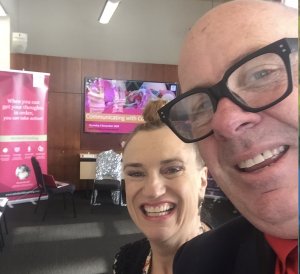At MindMeld, I have been working from home for the past eight years, and Kristan for the last three years. We know a lot about working from home, but it wasn’t until this week when several people starting asking me about it, that I realised how much Kristan and I know about how to function effectively when working from home, in terms of practical tips, how to manage emotions, and stay connected with colleagues.
We are both extroverts. I need a lot of people contacts per day, otherwise, my emotional and physical energy gets low. Our MindMeld Purpose is all to do with helping people through coaching and workshops, so I need to be around people to feel on purpose in my work. We have strategies that keep our focus and energy up as we work from home and want to share them with you. Please feel free to adapt them in a way that works for you, the working from home requirements of your agency, and of course, complying with any legislative and Ministry of Health requirements.
Our office is affectionately known as ‘The TARDIS’, as it is decorated to reflect Dr Who, one of our favourite Sci-Fi TV shows. Working from home is probably hardest for me when it is raining, cold, and everyone is home for the school holidays. Dishes pile up, Winston our cat will get his fur wet and muddy, and then he smells a bit like an old sheep. That’s when he will sit on me or on my keyboard. Family interrupts because they are bored or hungry. Be compassionate to yourself and to them. You will get interrupted a lot, so roll with that.
Here are the three qualities that we think are the most important in working from home:
Time Management – Goal setting – Self management
Time Management
Work out your most creative period. For me, that’s in the morning. Inspiration can strike any time from 5.30 a.m. onward, and I know I am at my best designing coaching tools and handouts till about noon. I try to protect this time (and also be really quiet so I don’t wake up everyone) and will resist texting or interruptions as much as I can. I have ‘meetings with myself’ in my diary so that my colleagues know I am working on something important and give me that space. It also helps with the little dopamine hits in my brain of having achieved something that day. Then I really want to be with people in the afternoon. That’s when I hold coaching sessions (face to face while we still can otherwise it’s online), and also have phone and Zoom meetings.
Having a routine helps you achieve your work and balance demands from home. Decide a start and finish time, and stick to them. Close the door when you finish.
Goal setting
What must I do today? What would I like to achieve?
I work that out and start with my ‘must dos’’. If I feel a bit overwhelmed with a lot of must do’s, I begin with the task I have the most energy and enthusiasm for and as this gets my brain going for the other tasks. I find this works better than doing a whole lot of ‘shoulds’, as this can spark ideas, and I find life just goes better this way.
Self management
Skype coffees
I can get lonely working from home, and have some good strategies in place to deal with that. ‘Skype coffees’, where colleagues or friends make a coffee at their place, and then we go online and drink them together. I try to be upbeat and positive when having these kinds of meetings so that we energise each other.
Inspiring yourself
Make a playlist of music that helps you think and is uplifting. Doing a little dance in the office is energising and fun. [Check this out for some fun moves Never Stop Dancing NZ] I also bring other people into the office virtually, as I am very fond of audiobooks (check out Overdrive or your public library where you can download loads of great audio and e-books for free). I have the audiobooks running when I am tidying or filing because I really need motivating to do that!
We also have a couple of funny YouTube clips or inspiring speaker clips that might be 2 minutes long that provide a bit of boost and I might call them up if I need a bit of connection or cheering up. Here they are: Megan Rapinoe co-captain US soccer team speech excerpts; Animal Odd Couple Man who has a buffalo living in his house.
On the wall above your computer screen, create a collage of people you love and things you love to do, plus mantras to see you through. We also have our operating model on the wall in front of us to help guide decisions and remember our values. Decorating the wall in front of you with important reminders is really helpful, and your online guests won’t be able to see it.
Managing your thoughts
If I am home alone for too long, I find it hard to be confident in decisions and things might bug me that wouldn’t normally, and I become guilty believing my own thoughts and judging a situation. One of my best coaching tools is to do some inquiry and ask myself ‘Is this really true?‘ “Could there be another reason for this?’ and take a breath before responding. If we don’t have people in front of us, we are missing the vital clues to motivational behaviour that their body language provides. When we can only go by what they write in their emails, it’s so easy to feel triggered. I stop and think, ‘What is their positive intention underpinning their message?’ That helps with perspective.
Working from home requires a lot of compassion because your people aren’t in front of you but their emails are. I find taking my time to answer is really helpful. Kristan says “Check yourself before you wreck yourself”
Managing your home
The washing!!! Many people say they can’t work effectively from home if the house is a bit messy or there is something about the house that needs attention. You wouldn’t be late to work because you needed to fold all the washing, would you? Do the housework until your normal work start time, and then you can complete it once the day is over. One of the benefits of working from home though, is that you can bring the washing in if it starts to rain – very handy in Wellington.
I can stand in front of the fridge or pantry willing it to be full of yummy snacks. This comes from boredom. Try and eat healthy snacks instead. I find having my office at the bottom of the garden very handy in keeping me away from the fridge.
Getting ready to work from home
Get your home office or working space ready before you need it.
If you can, decide a dedicated space that is separate from other household activities. This includes important supplies such as printer ink, paper, and also tea and coffee, as well as complying with all your employer’s requirements for secure and confidential distance working. A lockable filing cabinet is also handy so everything is secure if you do have paperwork (think Privacy Act and also Healthy and Safety).
Sort out your wifi and invest in a wifi booster.
Nothing like trying to have an online meeting when someone else in the house is sucking down all the wifi for Netflix or downloading a giant game. This does not lead to harmony when working from home!
Practice using the online meeting tools
Have a trial go on your computer with Skype, FaceTime or Zoom, so you know how to work it. It’s very frustrating for others if they are waiting for you to join a conversation because you didn’t realise that it takes longer than you think.
Have a practice online meeting with a friend and ask them to check what they can see of your working space behind you. You want to appear tidy and you don’t want your fellow Skyper to see a mess, or photos or artworks you consider, ahem, private. They can give you feedback on how you place your screen so that they see your face and not your chins, up your nose, or the top of your head.
When you are on a call like this, people can still see and hear you, even if you don’t think they can, or you forget they can. I have seen people clearly do other work, scratch, pick their nose, and even walk away from a Zoom meeting because they forget people can see them.
A mantra
My mantra right now is ‘Face Everything And Rise’. I also love this quote from Lao Tzu, to help all of us as we head to working from home. “I have just three things to teach: simplicity, patience, compassion. These three are your greatest treasures.”






